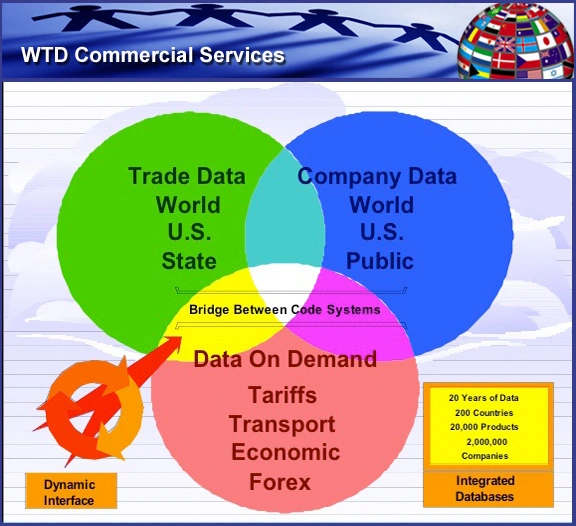During a presentation on trade data and application to a European convention of trade associations in Koln (Cologne) Germany, I exhibited the specific trading patterns and shipment details of several of their top exporters. Amidst currents of grumbling and disquiet throughout the audience, one spokesperson finally stood up and screamed, “How are you allowed to obtain and publish such information [about our companies and] who will stop you!?”
U.S. Waterborne Shipment import data collected daily by CBP (Customs and Border Patrol) under the supervision of the Department of Homeland Security (DHS) and made available through the FOIA (Freedom of Information Act) to the public by special request ($100 per daily DVD on a monthly subscription basis) reveals what many label as trade secrets about the particulars of international traders and their corresponding transactions.
There are times when the right hand doesn’t know what the left hand is doing.

US. Intelligence Community
Perhaps coincidentally, during the European convention, my stateside team was paid a surprise visit by an assemblage of well-dressed men representing “interested parties” within the U.S. intelligence community. They had been monitoring extensive data flows from our Nashville office to a Beijing location of what appeared to be sensitive information.
Thus began our campaign to (quickly) educate the respective intelligence agents involved as to the particulars of the data that we were selling to our associate in China (data that was publicly available through their own DHS/U.S. Customs as well as other TI vendors like ourselves). It was all rather terrifying. Not because we were doing anything unlawful or out of the ordinary, but because, on some level, it didn’t matter that we were in the right if our business was temporarily shut down while investigations were being made. It would have the same detrimental financial effect whether we were “right or wrong”.
Having had prior dealings with China, Inc. as to trade data being considered governmental trade secrets and my recent experience during the European Trade Convention, I was spooked and sobered. Obviously these folks took trade data seriously.
Ironically, much of my tenure at CenTradeX was spent in an effort to convince prospective clients of the relative merits of trade data. I’ve spent my career trying to mine and communicate value to end users utilizing technology and graphics. Despite my evangelistic zeal, by and large, most folks just don’t get it. To them, trade data is about as interesting and as sexy as dirt.

Dollar General's Zero Budget to Improve Sourcing
I remember meeting with top procurement executives of Dollar General trying in vain to convince them to use trade intelligence to enhance their sourcing efforts. Here’s a company that generated 8 billion dollars in annual revenues with conceivably half sent to overseas suppliers. Their projected budget for data: ZERO. Their projected budget for data analysts: ZERO. The value they placed on trade intelligence: ZERO.
China Inc., the European trade community and the Intelligence Community don’t share that perspective. The right piece of intelligence aptly applied at the right moment has won wars. Inversely, acting on wrong information has been catastrophic.


 15/06/2011
15/06/2011 
























































































































































































































































































































































Comments are closed.